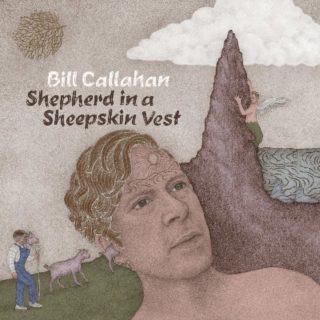Bill Callahan
Shepherd In A Sheepskin Vest
8/10

8/10
In the six years since Bill Callahan released his last album – his longest time away in a 30-year recording career – he has fallen in love, got married, had a son, and watched his mother die of cancer. On the one hand, it’s perhaps unsurprising that these major events form the backbone of much of his 16th/17th/18th record (depending on how you count); on the other, however, for a musician as notably inscrutable as Callahan, the candour with which he discusses how his own life has altered – and the vast spectrum of emotions he uses to do so – is gently shocking: where previous Callahan albums have been filled with gnomic invocations of nature, ironically detached and abstracted character sketches, and oblique political musings, Shepherd in a Sheepskin Vest features couplets as direct as “I got married to my wife / She’s lovely”, and insights like “True love is not magic – it’s certainty”, as beautifully observed as they are nakedly honest.
A similar immediacy is instantly noticeable in the songwriting, too: Callahan’s last two albums contained 15 songs between them, each of them self-contained mini-epics that rose and fell with a novelistic grace. By contrast, Shepherd… alone packs in 20, half of them clocking in at under three minutes, and each brimming with references and callbacks to one another: lyrical motifs run across the album concerning water and family heraldry, the resetting quality of morning and the titular sheep-herding, and adjoining songs introduce or back-announce each other to the extent that there’s a sense that any skipping or shuffled playback of the album would damage the desired effect, like pieces removed from a jigsaw puzzle.
That’s not to say, however, that Shepherd… is an unrecognisable departure. Indeed, for all the structural upheaval, this is still obviously a Bill Callahan record, and his musical trademarks – sparse acoustic guitar up against wholesome upright bass and that oaky baritone burr, equal parts poignant and ruminant – hang just as cleanly on this new body. Lyrically, too, despite the newfound sincerity, there’s still plenty of room for Callahan to exercise his wry one-liners – “Like motel curtains, we never really met,” he explains in ‘Angela’; “I’ve got the woman of my dreams / And an imitation Eames” goes a treatise on comfort in ‘What Comes After Certainty’ – and his observations on fatherhood (“The panic room is now a nursery”, “Grover counts to 50 in the other room, sweetly forlorn”) are as neatly perceptive as anything he might’ve written in the past about bar-room interactions or doomed relationships. He thankfully also hasn’t retired his ability to completely floor the listener with a devastating simile, the winner here coming in ‘Circles’, when Callahan describes bidding his mother farewell in the cancer ward with “kisses sweet as hospital grapes”.
Callahan once described his albums as having “usually one character per record. So, the character appears in all or most of the songs on one record, and then is gone.” Here, for the first time in a sprawling discography, that character is unmistakably Callahan himself, an act of surprise autobiography which is initially disconcerting and then more tender and relatable with every repeated listen, although never soppy or mawkish. The record may lack the dazzling poetic ambition and complexity of his best work, and its monolithic intensity demands perhaps closer concentration than its content ultimately rewards, but it nonetheless remains a rather touching insight into a musician usually too opaque for true empathy, a shift in stance as welcome as it is unexpected. “Love changed me” Callahan confesses on the final track; even if it is just for one album, that change here resembles a rather humbling and inviting gift.